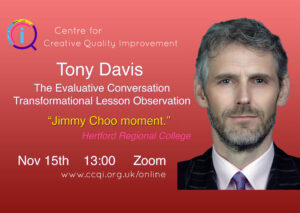The only pedestals we fall off are the ones we put ourselves on

I’ve noticed recently that some quality managers want to shy away from the word ‘observation’. It seems that some have been brow-beaten by union reps claiming that teachers feel like they’re living in a Surveillance State and that there’s no trust anymore between management and front line. What a terrible situation for all, but particularly for our teachers. There is a reason for this, and I feel it’s quite straightforward to understand; though I’m not saying it’s an easy fix. We’ll be looking at a solution over two upcoming online sessions on November 15th and 30th. More details here: www.ccqi.org.uk.
I hated school (promise this isn’t a tangent). Most of the teachers were truly awful. I didn’t much like music college either as it was more of the same: sitting still while being told lots of stuff I had to remember for an exam. My Arts degree was amazing, though not really because of the teachers; it was the opportunity, or rather insistence that we were creative. So on graduating, the last thing on my list of career options was teaching. A year after graduating, I wanted to pick up my saxophone studies and found a great local teacher – who, sadly, was full and couldn’t take me on. But a few weeks later, he phoned and asked if I’d take over his teaching for a few weeks at the local college. I didn’t hesitate, I said NO!
After a little cajoling, he twisted my arm to spend a few days observing him teach. It was a complete revelation. I’d never seen anything like it. He respected his students. He created a culture in which everyone could make mistakes without fear of failure. He created learning experiences, rather than lessons. And students couldn’t get enough of it. I was hooked.
I got into teaching because of observation.
The year was 1987, and FE was yet to experience the transition into brutal quality systems, which began to emerge after incorporation in the early 90s.
When quality managers are uncomfortable with the word ‘observation’, it’s almost always because they are seen as the quality police. It’s a wonderful, easy indicator that the culture surrounding observation is broken. It’s also a woeful state in which teachers are being denied the best quality improvement there is: self-reflection and pedagogy discussions with colleagues.
In Michael Wilshaw’s Common Inspection Framework of 2015, we were given this evaluative statement: ‘…robust performance management to tackle weaknesses…’ Macho, isn’t it; and how ironic. Sustainable quality improvement does not come from twisting someone’s arm up their back. Furthermore, quality processes are really there to help that small percentage of teachers who aren’t making the difference needed. But strong-arm tactics do not work on this group of staff, as they simply go into denial about the observer’s findings – they just say you’re wrong, then carry on with their usual practice.
In short, when observation systems use feedback, they won’t work on those who most need it. The solution, then, is not to give feedback.
In the online session on November 15th, we’ll be looking at how to make observation produce sustainable improvement, without feedback. More details here: https://www.ccqi.org.uk/evaluative-conversation.
And if you find yourself empathising with this extremely logical approach, you may well also be interested in the second session on November 30th: https://www.ccqi.org.uk/RED. In this session, we’ll look at a fully data-rich, union-friendly system that makes teachers want to invite you into their classrooms.
Here are a few comments from providers who’ve chosen to embed RED as their new observation culture:
- “The RED approach has transformed an old, ineffective observation system, into an engaging cycle of professional development for Teaching & Learning. It is a completely fresh way of looking at how to improve T&L and it has been revelatory for our teams!” Steph Garland, Teaching, Learning and Quality Improvement Lead, Hereford College of Arts
- “The data (RED) provides gives us insights into the interests and needs of our teachers – it turns out they are greedy for strategies which support engagement. The teachers like (RED), it stimulates thought, conversation and enthusiasm around TLA.” David Perry, Head of Quality, Bolton college
- “Our RED philosophy is simple: This model empowers teachers to support one another, fostering peer learning, encouraging experimentation, and promoting a non-judgmental feedback culture. This rekindles discussions, encourages self-reflection, and empowers our staff to learn from each other, explore new ideas, and strive for continuous improvement.” Lee Nevill, Teaching and Learning Manager, East Coast College
Do please join us if you can and tag any of your colleagues who might be interested, and/or share with your own networks if you’re able.
Thank you for reading. Best wishes, Tony.
#FE #observation #RED #c4cqi #JoyFE #UKFEchat #TonyDavis




Comments
No comments yet